Customer Services
Copyright © 2025 Desertcart Holdings Limited
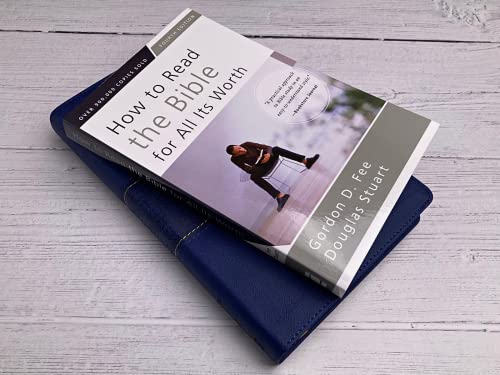

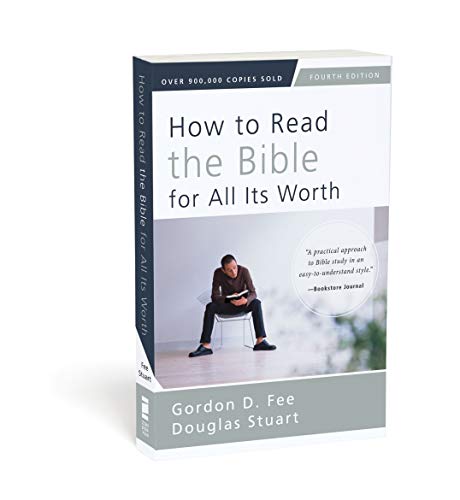
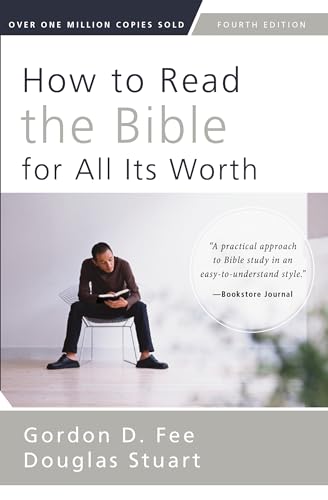
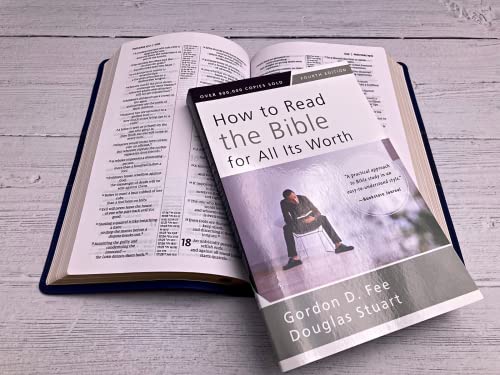
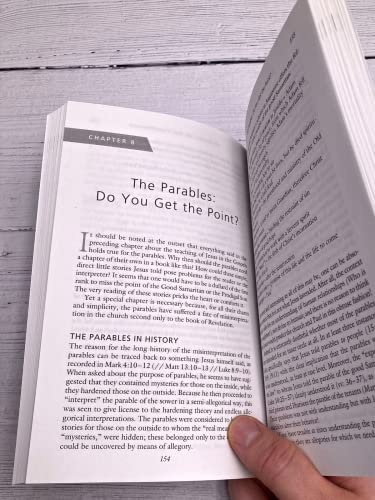
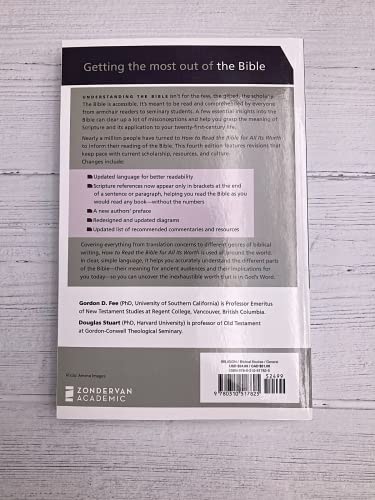

How to Read the Bible for All Its Worth: Fourth Edition [Fee, Gordon D., Stuart, Douglas] on desertcart.com. *FREE* shipping on qualifying offers. How to Read the Bible for All Its Worth: Fourth Edition Review: Great - Great Bibles Study book with good reading Review: Very helpful - This is an invaluable resource for those who wish to learn how to properly understand the word of God in its context. Can’t recommend it enough.










| Best Sellers Rank | #3,611 in Books ( See Top 100 in Books ) #6 in Christian Bible Exegesis & Hermeneutics #50 in Christian Bible Study Guides (Books) #142 in Christian Spiritual Growth (Books) |
| Customer Reviews | 4.7 4.7 out of 5 stars (2,990) |
| Dimensions | 5.21 x 0.73 x 8.05 inches |
| Edition | Fourth |
| ISBN-10 | 0310517826 |
| ISBN-13 | 978-0310517825 |
| Item Weight | 2.31 pounds |
| Language | English |
| Print length | 304 pages |
| Publication date | June 24, 2014 |
| Publisher | Zondervan Academic |
A**R
Great
Great Bibles Study book with good reading
A**R
Very helpful
This is an invaluable resource for those who wish to learn how to properly understand the word of God in its context. Can’t recommend it enough.
L**.
Can't Recommend Enough
It’s hard to overestimate the impact this book has had on my life. As I read it the first time, I believed I was being given the tools to accurately understand the Bible for myself. As I’ve recently reread it, I found myself strengthened and encouraged. The authors clearly and thoroughly explain the importance of interpreting the Bible and present a wise process for pursuing that. This is a detailed work, but not overly technical. It’s written so the average person can understand the content. The chapters contain a lot of information, so the book may be more helpful as a reference work, but I have benefited from reading it all the way through. If I had to recommend one book on studying the Bible, there is no competition—this is the book.
R**H
A bargain at $3.95 if you want to better understand your Bible!
The Kindle formatting could be a bit better especially with graphs and examples, but that may be why the price is only $3.95! A super bargain in my book!:) (Update 11/21/14 - based on the book preview, the formating has been fixed, but now the price is up to $12.99 - still reasonable for the most Biblically sound, while not overly academic, book on hermeneutics.) In summary, Fee and Stuart book serves as a bridge between academics and lay people on the subject of understanding and applying scripture. Because of the excellent structure of the book, people can read the book with Fee and Stuart's opinions, and then form their own ideas. The breath of their knowledge will definitely help one interact with the Bible better. Ok first the facts: my seminary professor forced me to do a book critique on this book. At first I hated it, especially because I had the third edition. I took my teacher to task three times and had to stop reading the third edition. Then-hooray-I found out the fourth edition was published and even though the content isn't all that different; at least I didn't have to deal with ten year old scholarship and the TNIV notations. I made it through the first three chapters, and it was mostly clear sailing after then!:) This book is a book on hermeneutics (understanding what scriptures meant back then and applying it correctly to your life) of the various types of writing types found in the Bible so that people can understand their Bibles better in their devotional and study times. This book bridges the gap between scholarly hermeneutics textbooks and the general public. While it is tough to wade through at times, it is probably the best popular hermeneutics book, because of its easy chapter structure.The book would be best for people who have tried to understand the Scriptures but need some extra help. The best idea in the book is to read books of the Bible in one sitting. A close second is to consider whether the type of literature one is reading can be applied in one's life. The best advice I can give is for your first reading of this book, skip the sections that attack doctrines that you hold dear and move on so you can learn from their scholarly opinions. The outline: Bible study starts with a good Bible translation uses the latest scholarship, is egalitarian, and uses the best Hebrew and Greek manuscripts like the NIV or NRSV. Read a book through a few times, then break it into sections and paragraphs for concentrated study. A passage should generally mean what it did to the original hearer; unless it is prophecy, and then it can be forward-looking as well. Some culturally-relative things that applied then are not useful now. The Epistles are generally letters that arise from a certain event. Old Testament narratives are non-allegorical and written on three levels: the universal plan of God, the covenant formed with Israel, and the individual narratives. Acts is a mostly non-normative story of the Holy Spirit-led mission to the Gentiles that shows the practice of the Early Church. In the four Gospels, Jesus used parables, metaphors, similes, and proverbs in different contexts to teach people things, especially about the "already here, but not yet" Kingdom of God. The key to understanding parables is to identify who the audience was and what they would have understood from it. These can be translated into culturally relevant language, to get an equivalent response. Old Testament laws and covenants are important because of their relationship between God and Israel, while only those commandments repeated in the New Testament (like the Ten Commandments and morality codes) apply to Christians. The Prophets were sent to specific people at a specific time, to usually warn Israelites when they were not following God's Law revealed to Moses. Psalms are different types of generally metaphorical poetic songs of worship from humanity to God that can be used today in similar situations. Read the books of Wisdom Literature in full to find theological truth. Revelation is an apocalyptic warning to Christians for a future time grounded in Old Testament imagery. Doctrines this writer thought might in error included Stuart and Fee's biases toward the anti-properity/health Gospel, egalitarianism, and the NIV Bible. I believe in a God who is my Shepherd and I shall not want, and wants me to have good things. I can figure out when "humanity/women is/are in view" and I'd rather have the original pronouns. Everyone has a favorite translation- mine is the NKJV- I think the Greek textus receptus is better with about a thousand similar books compared to the three very early but contradictory books of the critical text. Some rules, like "personal applications of the scriptures must have occurred to the original hearers," and no "proof texting," without considering a whole chapter, book and /or Bible theology, reduce chances of a scripture getting misinterpreted. But, they seem arbitrary. Personal revelation is discounted while plain meaning is trumpeted to rightly guard against misinterpretation. But scripture (Deut. 29:29, Ps 25:14, Eph. 3:5, 1 Cor. 2:10) indicates that there is personal revelation and the Holy Spirit isn't limited to teaching the original plain meaning. Fee and Stuart make good points about how people emphasize certain scriptures and not others, especially in 1 Corinthians. But they have their own opinions about scriptural verses, like the story of the rich man going through the eye of a needle, which many others, including Jews by birth, would dispute. To understand their biases here's a quick biography on them both: Dr. Gordon Fee received his Ph.D. in New Testament Studies from the University of Southern California. Fee taught at Wheaton College and Gordon-Conwell Theological Seminary and is at Regent now. Fee is an ordained Assemblies of God minister and pastored several churches. He is a member of the "Board of Reference" for "Christians for Biblical Equality." Fee has published more than 15 books, including many New Testament Commentaries like Philippians, 1 Corinthians, 1 and 2 Timothy and 1 and 2 Thessalonians. Fee is the retiring editor of the New International Commentary on the New Testament. In 1985 Fee wrote the book The Disease of the Health and Wealth Gospels. Fee is a member of the Committee on Bible Translation, which produces the New International Version Bible (NIV). Douglas Stuart is the current Old Testament Professor at Gordon-Conwell, an independent evangelical seminary. He is the Senior Pastor of Linebrook Church, an independent church, where he describes himself as a conservative Baptist minister. He has written Old Testament Commentaries on Hosea, Ezekiel, Malachi, and Jonah, a book on Old Testament exegesis and many articles for popular Christian and Hebrew magazines. He is active in the Evangelical Theological Society.
A**R
excellent read
The author has done his homework, assessed his audience and delivered a very good presentation for students of the Word.
S**T
A thorough, thoughtful, and theologically rock-solid book
Reading the Bible is not as simple as it seems. Many of my friends have picked it up, started at the beginning, and given up somewhere around Leviticus - mostly because they don’t understand how rich and complex the Scriptures really are. This book aims to serve as a guide for those who want to discover the riches of Gods word for them today. Some of my favorite features: Each chapter starts with guidelines for interpreting a different genre found in the Bible, then includes a detailed example. Wonderful! A fantastic list of reliable commentaries for each book of the Bible can be found in an appendix at the end. Those who teach the scriptures should be careful not to miss this incredibly helpful resource! A consistent commitment to the dual functions of exegesis (understanding what the text meant then) and hermeneutics (understanding what the text means now) give this work a firm foundation, beginning to end. Thanks for blessing the church with this work!
D**S
Very helpful guide to reading the Bible
This was a great read. The detailed breakouts of how to properly read and understand each literary style within the Bible, allow for greater comprehension and understanding of God’s word.
J**N
Well written, consistently easy to read, enlightening
PRO - as the title says, the book is enlightening, edifying, and well written. CON - The authors make some assumptions that many in the Church will not agree with. But that is par for any book on Theology. No two believers agree on every single point of doctrine and that's to be expected and accepted. The important thing is that they explain their point of view and remain consistent, which they have done.
P**D
i enjoyed this very much. helpful insights
C**E
Superb condition of product and very timely arrival. Thank you
M**O
Questo è un libro che mi ha cambiato la vita! Mi ha concesso di realizzare una comprensione più precisa e più profonda del testo biblico e, come è scritto, la conseguenza è stata: ‘conoscerete la verità a e la verità vi farà liberi’. Come credente ho potuto sperimentare una maggiore profondità nella comprensione del messaggio divino, una maggiore dipendenza dalle Scritture e una minore dipendenza dalle tradizioni ecclesiali, una nuova visione di come Dio abbia potuto parlare a uomini e donne come me, e di come questo messaggio indirizzato a loro possa parlare a me oggi. La cosa sorprendente è che tutto questo è accaduto con un testo rivolto a tutti in maniera semplice, non attraverso i testi accademici cui ero abituato nel mio studio delle Scritture. Gli autori, due dei maggiori esegeti rispettivamente dell’Antico e del Nuovo Testamento, hanno la rara capacità di scrivere testi autorevoli per il mondo accademico (che ho potuto apprezzare successivamente), ma anche testi straordinariamente chiari e comprensibili ai non addetti ai lavori. A tutti quelli interessati allo studio della Bibbia vorrei dire... provare per credere!
B**H
One of my favorite books of all time. I heard Gordon Fee speak once in Holland I think and he lives this book and it is excellent.
E**N
This book by Gordon Fee & Douglas Stuart is an indispensable guide to analyze, understand and interpret the Bible correctly. Between us, my wife and I we have 3 - the first Spanish translation of 1985, the 2nd edition in English (1993) and this 4th English edition in Kindle.
Trustpilot
2 days ago
1 month ago